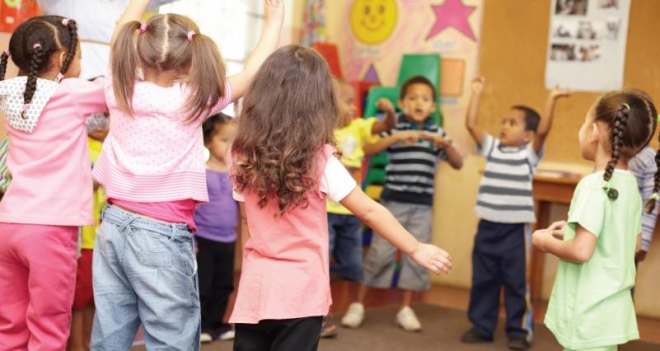Don’t Expect ADULT Behavior

Four Things Teachers Shouldn’t Be Asking Their Students To Do
Spider-Man’s Uncle Ben could have been speaking directly to teachers when he said, “With great power comes great responsibility.”
As teachers, we can make kids do almost anything we want. They’re smaller than us. We have all kinds of power over them, from getting them in trouble at home to taking away the things that make school tolerable, like going outside for recess or sitting with their friends in class. But just because we can make our students do what we want doesn’t mean we should.
Children aren’t just smaller versions of adults. They are their own kind of being. They need to move, talk, question and explore more than we do, because they’re in the midst of that mind-boggling explosion of cognitive, physical and social-emotional growth that marks childhood in our species. When it comes to behaviors like staying quiet or sitting still, it doesn’t make sense to hold young children to norms better suited to adults, because the way they experience the world is fundamentally different from the way grownups do.
In school, we often ask children to do things that are unreasonable given their developmental level. Worse still, we sometimes ask them to do things we would never expect of adults.
Take these four examples.
1. Silence
Many schools expect a monastic code of silence while students are traveling the halls. The rationale makes sense at first glance, and it’s one I’ve explained to my class many times: “Other students are working right now, and we don’t want to disturb them.”
Still, if I were a kid, I’d wonder: “If that’s true, why aren’t teachers silent in the hall?”
Every time I run into a colleague in the hallway, we talk together while we walk to wherever we’re going. We chat about anything and everything, from the chances we’ll get a snow day tomorrow to the latest season of “True Detective.” This kind of conversation doesn’t seem to bother the kids working in classrooms off the hallway. Why would the voices of kids be any different?
Chatter in the hallways, or even the squeaking of wet shoes on the floor as a class returns from recess or P.E., doesn’t seem to bother most students. In fact, the only occasions when I’ve seen kids completely distracted by what’s happening out in the hall are those times when a teacher is reprimanding his or her class – often at a far greater volume than whatever commotion their students were causing to incur the reprimand.
We should take a close look at the times we expect kids to be silent in school. We need to distinguish between those times it’s truly for the good of the students, and when it has more to do with the appetite for control so deeply inculcated in adults placed in charge of children.
2. Sitting Still for a Long Time
Teacher Alexis Wiggins shadowed high school students for two days, doing whatever the students did, and was shocked at what she experienced.
“I literally sat down the entire day, except for walking to and from classes. We forget as teachers, because we are on our feet a lot – circling around the room to check on student work, kneeling down to chat with a student … we move a lot. But students move almost never. And never is exhausting.”
For young kids, sitting still is even harder.
There’s a lot we can do to make it easier on them.
• Build in strategies like Total Physical Response for learning vocabulary, so students are moving while they learn.
• Take brain breaks – including dance parties. There are plenty of great videos on websites like GoNoodle, or you can make up motions to classic children’s songs like Raffi’s “Biscuits in the Oven” and “Tingalayo.”
• Let students get up – without raising their hand for permission – whenever they need to get a book from the class library, grab a pencil or just stretch their legs for a minute.
• Above all, keep the teacher talk time to a minimum. A useful guideline is that students should be able to listen attentively for their age in minutes – five minutes for a kindergartner, 15 for a sophomore in high school. Save most of your words for conversations with students one-on-one or in a small group. Children, like adults, learn the most when they’re engaged in meaningful work – not sitting and listening while the teacher does all the talking and thinking.
3. Forced Apologies
I have definitely been guilty of this one. I’ll break up a heated argument, then immediately demand that one or both kids apologize to one another, while their faces are still flushed with emotion from their recent conflict.
The early-childhood program my daughter attended never made the children tell each other “I’m sorry,” because an apology extracted by an authority figure isn’t a true expression of remorse.
Forced apologies don’t seem to offer much satisfaction to the child who receives them, either – seeing the other child mutter “sorry” while glowering at his shoes pretty much never makes the recipient of the apology feel better.
Turbulent emotions take a long time to settle. We need to give kids that time.
4. Zero Tolerance for Forgetfulness
My friend and first-grade teacher Cameron McCain has a great line when teachers start grumbling about our students: “It’s like we’re dealing with a bunch of 7-year-olds around here!” His point is well taken. I get frustrated when Josh, who has been in my class for 17 months now, still forgets to check out a book or make his lunch choice when he gets to school. But like most adults I know, I’m a lot like Josh. I once turned on the coffeemaker without putting the coffeepot in first. (I didn’t realize what I’d done until hot, fragrant coffee started splattering onto my kitchen floor.)
I forget sometimes that not only are my students human, but they’re also really young humans. When they lose their lunch tag for the third day in a row, or ask the exact same question two other kids asked 30 seconds ago, we need to take a deep breath and offer them a sizeable dollop of grace.
Kids Are Kids. That’s Exactly Who They Should Be
We need to think hard about the demands we place on our students. Just because they obey the strictures we lay down doesn’t mean those edicts are fair.
We can’t expect the children in our care to behave like miniature adults. They need to move around more than we do. They need to make more noise than we do. They need to experience new concepts with their fingers, senses and imaginative ability to consider not just the world as it is, but as it could be. Their curiosity, enthusiasm and sense of wonder will never lend itself to straight lines and silent deskwork.
We spend so much time bending them to our way of doing things. We should pay more attention to theirs.
Justin Minkel teaches first and second grade at Jones Elementary in Springdale, Ark., a high-performing, high-poverty school where 85 percent of the students are English-language learners. A former Teach For America corps member, Minkel was the 2007 Arkansas Teacher of the Year. In his instruction, he is focused on bringing advanced learning opportunities to immigrant and at-risk students. Follow him at @JustinMinkel.

